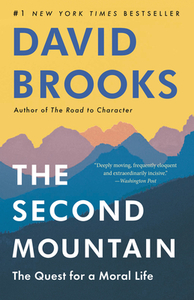You need to sign in or sign up before continuing.
Take a photo of a barcode or cover
It seems like this book stretched one metaphor to cover too many aspects of life. Some parts were relatable and important to keep in mind but overall nothing earth shattering in here. Also the idea of getting to the second mountain is a privilege and inaccessible to many—would be interested in Brooks’ thoughts on that.
I'm picky with self-help books as they can oftentimes come across as really, really preachy without providing any concrete ways to promote change. This book had some high points but overall I felt a little lost. The definition of a "moral life" is something that changes from person to person. The things Brooks claims will help one lead a moral life are things I don't find connection to or with. This may have been his way of paving a path toward living a moral life, but it didn't help influence mine much.
His chapter on marriage was definitely the most informative. I also liked the way he described a hyper-individualistic way of living, which I feel is really accurate and on-point. But overall, this book was okay. If religion and philosophy and faith are pillars in your life, this book may be for you.
His chapter on marriage was definitely the most informative. I also liked the way he described a hyper-individualistic way of living, which I feel is really accurate and on-point. But overall, this book was okay. If religion and philosophy and faith are pillars in your life, this book may be for you.
I found this book a slog to get through. Although there were parts that totally engrossed me, there were as many I found repetitive or completely off-putting. His journey from Judaism to Christianity after the breakdown of his first marriage was one. Having earlier said that you were fine with any religion or none (I couldn't find the place again, so my memory could be faulty) he then presents a deeply religious life as the only way to really reaching the second mountain. Admittedly that chapter is a very autobiographical one. And those mountains; the first the material world of success and money, but not necessarily or probably fulfilment, and the second mountain, the importance of relationships and commitments to ideals as well as each other. I also found off-putting the continual references to other books, other writers, religious thinkers, philosophers, novelists, poets, etc etc ad nauseam. While of course referencing others is important this ended up feeling to me as though he was trumpeting his erudition. The overarching theme of the second mountain is compelling, but I felt the whole thing could have been a really good essay. I also suspect that second mountain is a whole lot easier to climb if unlike most of America you aren't just trying to get by.
I have such different opinions on each part of this book I'm going to rate/review them separately.
Part One: The Two Mountains 5* - I was underlining and writing comments all over the place. Lots of chat about young people feeling lost when they leave education, and great introduction to the two mountains concept.
Part Two: Vocation 4.5* - still excellent, still thought provoking and inspiring.
Part Three: Marriage 3* - interesting but didn't feel as relevant or that it had anything new to say
Part Four: Philosophy and Faith 1* - maybe it's because I'm not religious myself but I found this part super boring
Part Five: Community 3* - a decent summary of the main points, and a nice end
Overall, I'd recommend reading Part One and any other part that interests you. An amazing start but the rest didn't hold up for me.
Part One: The Two Mountains 5* - I was underlining and writing comments all over the place. Lots of chat about young people feeling lost when they leave education, and great introduction to the two mountains concept.
Part Two: Vocation 4.5* - still excellent, still thought provoking and inspiring.
Part Three: Marriage 3* - interesting but didn't feel as relevant or that it had anything new to say
Part Four: Philosophy and Faith 1* - maybe it's because I'm not religious myself but I found this part super boring
Part Five: Community 3* - a decent summary of the main points, and a nice end
Overall, I'd recommend reading Part One and any other part that interests you. An amazing start but the rest didn't hold up for me.
This book felt like a lot of stuff I've learned at church and from my family--but I guess maybe I'm taking that for granted. I really like the paradigm that Brooks creates of the mountains we are told to climb (financial wealth, professional success, the house, the car, the perfect family) and the mountains that will truly make us family (peace in a belief system, connecting with others, building community, living according to strong core values). I like how he talks about the eras of community (Depression, WWII) and individuality (60s and onward) and how there are positives and negatives to both philosophies of living. But how now our hyperindividualistic culture is leading us to an epidemic of loneliness and disconnection. I'm probably rating this 4 stars because I've been thinking a lot about the need for community and looking for ways that I can be a better community builder, so I drank up all the examples of how people are doing that successfully, that Brooks shares.
This book examines the moral life in relation to others, and I loved it so much! There is so much good information here. The chapters on marriage had some of the best advice I have heard. I enjoyed his thoughts on being a Jew and a Christian at the same time, and the chapters on community building. Lots of notes taken, and I highly recommend this one!
Not what I expected
Rounded up from2.5 stars. I found the idea interesting and compelling. But his method of going about it was not at all interesting to me or very applicable. I could see some of his ideas and think of other books I’ve read that covered them better.
Rounded up from2.5 stars. I found the idea interesting and compelling. But his method of going about it was not at all interesting to me or very applicable. I could see some of his ideas and think of other books I’ve read that covered them better.
Excellent. A common grace (that is, right and true without being distinctly Christian or even faith-based) look at what makes for a rich and deeply satisfying life. Against the hyperindividualism of the moment, Brooks writes that commitment to a vocation, philosophy/faith, relationship, and community are the keys to scaling the "second mountain" of life. Combining the wise thoughts of others with effective stories and self-revelation, I found the book to be enjoyable and wise.




